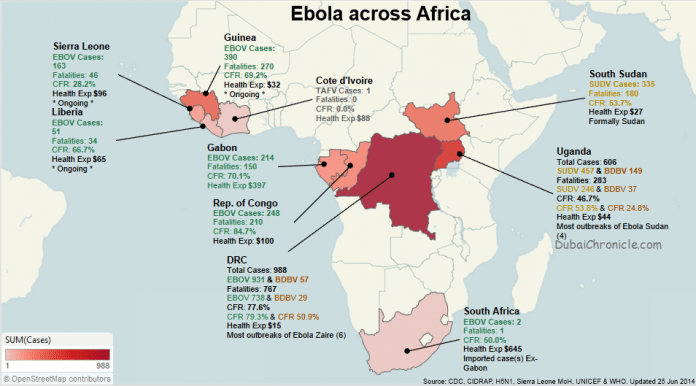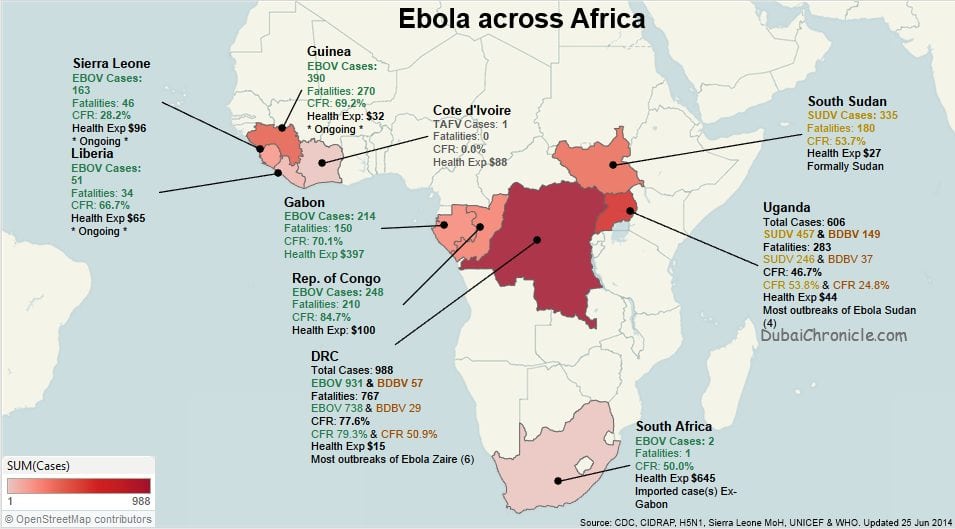
The current Ebola epidemic, which started in March in Guinea and is now sweeping across West Africa, is the largest and the deadliest in history, described by experts as “out of control”. With over 1,200 infections and at least 672 deaths, the Ebola outbreak is putting countries and global health authorities on alert. But how serious is the threat?
The Ebola outbreak started in Guinea this spring and spread to Sierra Leone, the current epicenter, and Liberia. It has infected doctors and nurses, including two American workers, as well as Sierra Leone’s leading expert, Dr. Sheik Umar Khan. On Friday, authorities announced that a man died from the disease in Lagos, Nigeria after flying from Liberia on a passenger flight. Affecting commercial aviation, the case caused scare among health authorities and travelers. After two volunteers were exposed to the virus, the Peace Corps announced on Wednesday that it was evacuating its 340 volunteers. However, doctors remind that the virus isn’t so easy to contract and doesn’t represent a great danger. Yet, the spread of the terrifying sickness isn’t showing any signs of slowing down and even more deaths are expected in the coming weeks. Here is what we know about the Ebola virus so far.
The incubation period for the virus is from two to 21 days. Then the patient starts showing symptoms such as red eyes, rash, fever, headache, joint pain, sore throat, lack of appetite, and breathing difficulties. The infection is transmitted through direct contact with body fluids, including blood, saliva and sweat, and it is not airborne. Once infected, an individual has a little chance of surviving, as the death rate is 60% to 90%, according to experts. There is no vaccine and no specific treatment for the disease. This is the deadliest type of Ebola, the Zaire Ebola virus, which is different from the other four species.
The current outbreak is the worst in history, with more than 1,200 cases and at least 672 deaths reported over a period of five months, according to data from the World Health Organization. The situation is very complicated due to a shortage of medical resources, and most of all, due to the resistance from local communities believing it is doctors who inject them with something that can kill them. There is a great misunderstanding among the people about what Ebola really is – locals say it is witchcraft, not a disease. The outbreak is considered by experts as unprecedented and absolutely out of control. It is expected to get worse, especially in Liberia and Sierra Leone, while the risk of spreading to new countries is also increasing.
Liberia’s president, Ellen Johnson Sirleaf, declared a national Ebola emergency and ordered all schools to shut down. Country borders are also closed. After the passenger travelling from Liberia to Nigeria died from the virus, Togo-based pan-African airline ASKY stopped all flights to and from Liberia and Sierra Leone. Health care workers in West Africa lack adequate training and fail to follow infection prevention and control measures such as wearing protective clothing when treating their patients.
Currently, experts say that there is a little risk of Ebola spreading to other countries. But there is a real humanitarian crisis in Africa and more people will probably die in the next weeks and months.





































